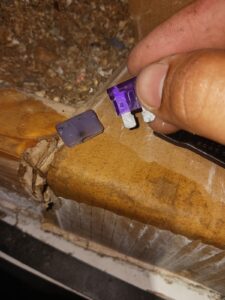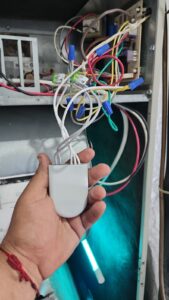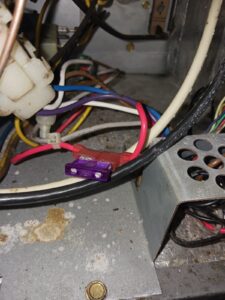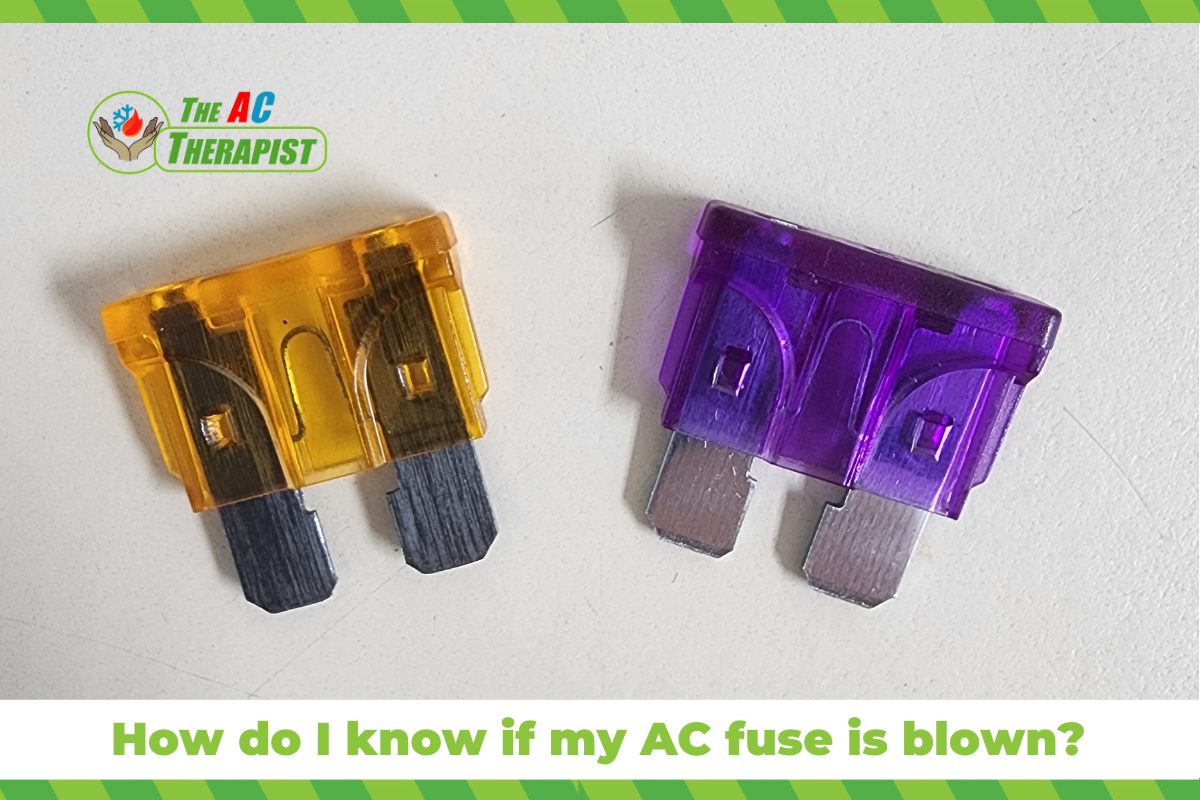How Do I Know if My AC Fuse is Blown? A Comprehensive Guide from The AC Therapist
At The AC Therapist, your local Tampa Bay AC repair experts, we understand how vital a well-functioning air conditioning system is to your comfort, especially during those hot Florida days. One common problem you may encounter with your air conditioning unit is a blown fuse.
But how do you know if your AC fuse is blown? Here’s our detailed guide on the signs to look out for and what to do if you suspect a blown AC fuse.
What is an AC Fuse?
Before we dive into the signs of a blown AC fuse, let’s briefly cover what an AC fuse is.
A low-voltage fuse, as the name suggests, is a safety device designed to protect the low-voltage circuits in your HVAC system. Low-voltage circuits manage components such as the thermostat and other control mechanisms, which operate at a significantly lower voltage—typically around 24 volts—compared to the primary AC system, running on 120 or 240 volts.
This fuse, often of the blade type similar to those found in automobiles, is integrated into the control board of your air handler or furnace.

How Does the Low-Voltage Fuse Work?
The low-voltage fuse is designed to act as a safety mechanism against electrical surges or short circuits within the low-voltage control circuitry of your HVAC system.
In case of an electrical fault, the fuse “sacrifices” itself by blowing or burning out, thereby interrupting the electrical circuit and preventing the surge from reaching the vital and more expensive components of your AC system, such as the control board. By doing so, the fuse prevents potential damage that a power surge can cause to these elements.
Importance of the Correct Fuse Rating
Just like other types of fuses, low-voltage fuses come with specific amperage ratings, which indicate the maximum electrical current they can safely handle. If the current exceeds this rating due to a power surge or fault, the fuse will blow to protect the circuit.
It’s crucial to use a fuse with the correct rating. A fuse with too high a rating may fail to blow when needed, risking damage to your system. Conversely, a fuse with a rating too low may blow unnecessarily, even when the current is within a safe limit. Usually they are either 3 or 5 Amps.
Identifying a Blown Low-Voltage Fuse
A blown low-voltage fuse can often be identified by visible signs such as a break in the metal filament or a blackened or discolored window in the top of the fuse. If your AC system isn’t starting or responding to thermostat commands, a blown low-voltage fuse may be the culprit.
Signs of a Blown AC Fuse
1. AC Unit Not Powering On
A common and clear sign of a blown AC fuse is if the AC unit is not powering on. If your unit doesn’t respond when you adjust the thermostat, this could be an indication of a blown fuse.
2. AC Unit Stops Blowing Cold Air
If your AC unit turns on but does not blow cold air, it could be due to various issues, one of which is a blown fuse. This situation might happen when the system is unable to draw the necessary current to function correctly.
3. Tripping Circuit Breaker
A blown fuse in your AC system might trip the circuit breaker frequently. If you notice that the breaker for your AC unit trips every time you switch on your AC, it could be a sign of a blown fuse.
4. Physical Damage
Fuses can also be visually inspected for signs of damage. If you have a multimeter at home, you can safely check the fuse after turning off and disconnecting the power. A blown fuse might show signs of melting, burning, or discoloration. However, not all damaged fuses show visible signs, so this method is not foolproof.
Why is my AC’s Fuse Blown?
Understanding why an AC’s fuse blows can help prevent future occurrences and maintain the health of your air conditioning system. There are several reasons why the low-voltage fuse in your air handler might blow:
1. Short Circuit in the Wiring
One of the most common reasons for a blown fuse is a short circuit in the wiring. This usually happens when a wire’s insulation deteriorates, allowing two wires to touch. When this occurs, the electrical current increases dramatically, causing the fuse to blow. A short circuit could occur due to natural wear and tear, pests, or improper installation.
2. Power Surge
Electrical power surges, which are sudden and temporary overvoltages, can cause the fuse to blow. Power surges can be caused by lightning, power outages, or other large appliances in your home turning on and off.
3. Overloaded Circuit
If too many electrical devices are connected to a single circuit, it can lead to an overload. In an HVAC system, this might occur if the AC unit is drawing more power than usual. This could be due to a malfunctioning component or an AC unit that is too large for your home’s electrical capacity.
4. Transformer Failure
The transformer in your HVAC system reduces the high voltage power from your home’s electrical system to the low voltage (usually 24 volts) used by the control circuitry, including the thermostat. If the transformer fails, it could send high voltage to the low-voltage circuit, causing the fuse to blow.
5. Faulty Thermostat or Control Board
Sometimes the thermostat or the control board in the air handler could malfunction, causing a surge in electricity that blows the fuse.
6. Incorrect Fuse
If the fuse used is not the correct amperage for your specific AC unit, it could blow. A fuse with an amperage rating too low will blow prematurely, even when the current is within safe limits.
If your AC’s low-voltage fuse blows, it’s a good idea to call a professional, like our team at The AC Therapist. Blown fuses are often symptoms of larger problems that need to be addressed to prevent further damage. We’re equipped and ready to diagnose and resolve any AC issues, including blown low-voltage fuses, in the Tampa Bay area. Trust us to keep your AC system running smoothly and your home comfortably cool.

What to Do If Your AC Fuse is Blown?
A blown AC fuse is a sign that your air conditioning system has experienced an electrical malfunction. If you suspect your AC’s low-voltage fuse has blown, there are a few steps you can take to confirm your suspicions and ensure the issue is properly addressed.
Steps to Take if Your AC Fuse is Blown
1. Confirm the Problem – First, verify the symptoms. If your air conditioning system is not responding to your thermostat or fails to start altogether, a blown low-voltage fuse could be the cause.
2. Safety First – Before attempting to check or replace the fuse, always turn off the power to your air handler at the breaker box to ensure your safety from electric shocks.
3. Check the Fuse – Locate the control board in the air handler, where you will find the fuse. Once you have identified the fuse, inspect it for visible signs of damage. A blown fuse often has a broken metal filament or a blackened window.
4. Replace the Fuse – If the fuse appears blown, replace it with a new one of the exact same rating. This is crucial because using a fuse with a higher or lower rating could cause the fuse to blow prematurely or fail to protect your system as needed. The rating (usually 3, 5, or 7.5 amps) should be clearly marked on the fuse.
5. Power On – Once the new fuse is in place, restore power to your air handler and check whether your AC system is functioning correctly.
6. Call a Professional – Remember, a blown fuse is usually a symptom of a larger issue within your AC system, such as a short circuit in your low-voltage wiring. Simply replacing the fuse might not fix the underlying problem and the new fuse may blow as well. Therefore, it’s recommended to consult a professional HVAC technician if your AC fuse blows.
At The AC Therapist, our experienced and licensed professionals are ready to help with any AC issues you encounter in the Tampa Bay area. We’re equipped to diagnose and solve problems that lead to blown fuses, ensuring your AC system operates smoothly and efficiently. Trust us with your AC repair needs because your comfort is our top priority.
How much does it cost to replace an AC fuse?
The cost to replace an AC fuse can vary widely based on several factors, including the price of the fuse itself, the cost of labor if you hire a professional, and whether there are underlying issues that also need to be addressed.
The cost of the fuse itself is typically minimal. A low-voltage fuse, such as the one in your air handler, can cost anywhere from $1 to $10 for a pack of fuses, depending on the brand and where you purchase them.
If you decide to replace the fuse yourself, then your cost would be limited to the price of the fuse. However, remember that working with electrical systems can be dangerous if you’re not experienced, and a blown fuse is often a symptom of a more serious issue.
If you hire a professional, the labor costs can vary significantly based on your location, the complexity of the job, and the specific HVAC company’s rates. On average, you could expect to pay between $150 and $200 for a service call, which usually includes the cost of the fuse and the labor to replace it.
However, if the technician discovers additional problems, such as a short circuit in the wiring, a malfunctioning control board, or other issues, the cost for repairs will be higher. It’s essential to have a professional address these issues to prevent the new fuse from blowing and to ensure your AC system operates safely and efficiently.
At The AC Therapist, we strive to provide fair and transparent pricing for all our services in the Tampa Bay area. We’re committed to diagnosing and fixing your AC problems effectively and efficiently to keep your home comfortable and your AC system in top shape.
Can a blown fuse cause my AC not to work?
Yes, a blown fuse in your air conditioning system can indeed cause it to stop working.
The low-voltage fuse in the air handler is a critical component of your AC system. It serves as a safeguard for the control board and other low-voltage circuitry, such as your thermostat, from potential electrical malfunctions like power surges or short circuits.
If the fuse blows, the electrical circuit to these components is interrupted. Consequently, your AC unit may not respond to thermostat commands or may not start up at all. So, if your AC system isn’t functioning as expected, a blown low-voltage fuse could be one potential cause.
Remember, it’s important to consult with a professional HVAC service like The AC Therapist if your AC isn’t working, as a blown fuse can often indicate a more significant issue within the system that needs to be addressed.

Where is my AC fuse located?
The location of your air conditioning fuse can depend on the specific design of your AC system, but we’ll provide a general guideline to help you find it.
In most residential HVAC systems, there are actually two types of fuses you might be referring to:
- High-voltage fuses or breakers are usually located in a disconnect box mounted on the wall outside your home near the outdoor AC condensing unit. These protect the larger electrical circuit powering your AC system and typically handle 120 or 240 volts.
- Low-voltage fuses are typically found inside the air handler or furnace, which might be located in your attic, basement, utility room, or in a closet. This fuse, often blade-style similar to car fuses, protects the low-voltage control circuitry, including the thermostat, and typically handles 24 volts.
If you’re looking for the low-voltage fuse in your air handler, here’s a general process:
- Turn off the power. Safety is paramount when dealing with any electrical system. Make sure to turn off the power to your HVAC system at the breaker box before starting.
- Locate the air handler. The air handler is the large box that contains the fan and the evaporator coils. If you have central heating as well, it may also contain your furnace.
- Open the air handler’s access panel. You might need a screwdriver to do this. Inside, you’ll find the control board where the low-voltage circuits are.
- Find the fuse. The low-voltage fuse is typically located on the control board. It’s often small, plastic, and a similar shape to car fuses.
Remember, if you’re not comfortable performing these steps, or if you replace the fuse and it blows again, it’s a good idea to contact a professional HVAC technician. At The AC Therapist, we’re ready to help diagnose and resolve any issues with your AC system in the Tampa Bay area.

How long do AC fuses last?
The lifespan of an AC fuse can depend on several factors, including the quality of the fuse, the condition of your AC system, and the stability of your home’s electrical supply.
Under normal operating conditions, an AC fuse can last for many years, potentially as long as the AC system itself. This is because a fuse’s primary purpose is to protect your AC system from electrical malfunctions such as short circuits or power surges. If your AC system and electrical supply are functioning properly, the fuse shouldn’t “wear out” over time.
However, if your AC system has recurring electrical issues, you might find yourself replacing the fuse more frequently. For example, if there’s a short circuit in your low-voltage wiring, it could cause the fuse to blow repeatedly until the underlying issue is fixed.
It’s also possible for a fuse to fail prematurely due to manufacturing defects, though this is relatively rare.
If you find that your AC’s low-voltage fuse is blowing regularly, it’s a good idea to contact a professional HVAC technician. The team at The AC Therapist is ready to help diagnose and resolve any issues with your AC system in the Tampa Bay area. Remember, a blown fuse is often a sign of a larger problem that needs to be addressed to prevent further damage to your AC system.
Trust The AC Therapist for AC Repair in Tampa Bay
Living in Tampa Bay means relying on your air conditioning system to keep you cool throughout the year. When you encounter problems like a blown AC fuse, you need a reliable and professional AC repair service like The AC Therapist.
We understand the importance of prompt service when your AC system is down. That’s why our team is committed to providing fast, efficient, and reliable AC repair services in the Tampa Bay area. Don’t let a blown fuse keep you in the heat – contact The AC Therapist today!
I hope you find this post helpful and informative. Remember, when it comes to AC repair in Tampa Bay, trust none other than The AC Therapist.
Stay cool, Tampa Bay!









